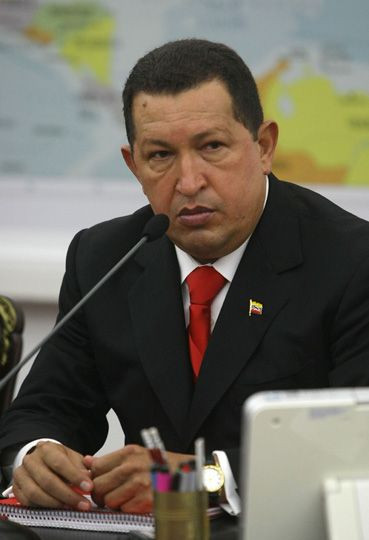
The fiery socialist revolutionary and one of the few world leaders with his own television program, Hugo Chávez, has died of pelvic cancer at 58. But who will be able to effectively assume the role of president following a leader who held so much of the government's power?
The late leader, who all but broke diplomatic ties with nations like the United States and instead befriended opposing forces including the Cubans and Palestinians as well as the Iranian government, in his dying days paved the way for his deputy, Vice President Nicolás Maduro, to succeed him. According to foreign minister Elias Jaua, Maduro will indeed take over control of the country, but only immediately be in office for as long as 30 days, by which time a new presidential election will take place.
Maduro, a 50-year-old high school graduate and former transit worker in the capital city of Caracas, is seen as Chávez' hand-picked successor. He was first elected to state office in 1998, a year before Chávez became president and became very close with the new leader at the time. He is credited for forming the Bolivarian Alliance for the Americas, an association of leftist governments in Latin America. He is seen to be very close with the Castro regime in Cuba and was vital in maintaining strong ties with late Libyan leader Moammar Qaddafi. He will likely be the Socialist Party candidate in the upcoming election.
While Chávez made his intentions clear in late 2012 that Maduro should succeed him if his health worsened, the Venezuelan constitution affords the speaker of the National Assembly to be next in the line of succession. Diosdado Cabello, a Chávez associate for more than 20 years, is, in that case, supposed to succeed in that role.
The 49-year-old, who has spent much of his life in military and public office, is seen to be less popular in the party than Maduro but also a strong military mind. He briefly assumed the responsibilities of presidency during a two-day coup. Opposition leaders had captured Chávez and imprisoned him in the Caribbean. Pedro Carmona, a coup leader and head of the nation's chamber of commerce, also claimed leadership during this time. Cabello immediately gave orders to free Chávez, who was reinstalled a short time later after being rescued by the navy. While Cabello has strong support from the nation's military, his multiple business interests worry about some leaders of the ruling Socialist Party.
A third potential candidate, Henrique Capriles, is also a contender in the contest. The co-founder of the Justice First Movement, the center-right opposition party in Venezuela, unsuccessfully challenged Chávez in the 2012 presidential election. Though opposition leaders have joined forces with another democratic movement in Venezuela in hopes of toppling the socialist leadership, analyst Carl Meacham told CNN he believes it would still be a tough road for any contender outside the ruling party.
"Capriles' 11-point defeat in October's presidential election, coupled with Chávez's allies winning 20 of 23 gubernatorial elections in December, underscores the fact that the opposition still holds little power," he said.
There are other pending changes in Venezuela that are being closely monitored, most notably any upcoming changes in relations with the U.S. and its allies, as well as changes to the operation of the PDVSA, the much-maligned state-owned oil enterprise which operates Citgo. Chávez is well known for referring to former President George W. Bush as "the devil" and similarly criticizing Bush ally, former British Prime Minister Tony Blair. According to CBS, President Barack Obama pledged to help "develop a constructive relationship [between] the [new] Venezuelan government" and the United States.
© 2025 Latin Times. All rights reserved. Do not reproduce without permission.




